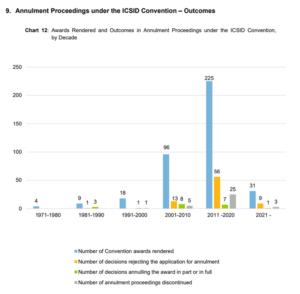Pursuant to Article 53 of the ICSID Convention, ICSID awards are binding on the parties and “shall not be subject to any appeal or any other remedy except those provided for in this Convention”. As correctly stated by the ad hoc committee in the Standard Chartered Bank v. Tanzania Electric Supply Company case, this “Article […]
News
Partial Awards on Unpaid Costs in International Arbitration
Unpaid costs in international arbitration are relatively common. Most rules of arbitral institutions provide that the parties must bear the costs of arbitration in equal shares. Difficulties may arise when one of the parties, usually the respondent, refuses to pay its share of advances on costs to cover the expenses related to the arbitration, including […]
English High Court Applies Doctrine of Waiver by Election in Jurisdictional Challenge to ICC Arbitration
In Province of Balochistan v Tethyan Copper Co Pty Ltd, the High Court held that Balochistan was precluded from raising a corruption allegation in the English annulment proceedings because it had failed to raise it as a jurisdictional objection in the underlying arbitration proceedings. The High Court further confirmed that by waiver of election, Balochistan […]
Translations in International Arbitration
Translations play a crucial role in international arbitration. In a forum where multiple nationalities and languages are involved, the use of translations is common. However, many arbitration users, and lawyers, remain unaware of the challenges of legal translations. While linguistic challenges may increase time and costs, little attention is paid to the complexity of language […]
Expert Evidence in International Arbitration
Expert evidence is frequently used in international arbitration. Experts are normally appointed by parties to give their independent opinion on issues beyond the arbitral tribunal’s expertise, such as quantum, delays and “foreign” law, thereby assisting the arbitral tribunal in its decision-making process. Party-Appointed Experts vs. Tribunal-Appointed Experts In international arbitration, there are generally two main […]
ICSID Caseload Statistics 2021: ICSID Reports a Record Number of Cases
On 7 February 2022, the International Center for Settlement of Investment Disputes (“ICSID”) released its Caseload Statistics for 2021 (Issue 2022-1), based on the cases registered or administered by ICSID as of 31 December 2021. As previously noted (see ICSID Caseload Statistics for FY2020), ICSID publishes its reports on ICSID caselaw statistics bi-annually, examining all […]
Expropriation in Investment Arbitration
Expropriation in investment arbitration concerns two notions: (1) each State’s right to exercise sovereignty over its territory and (2) each State’s obligation to respect properties belonging to foreigners. The first means that a State may, in special circumstances, expropriate a foreign investor’s property. The second means that the expropriation of foreign-held properties will only be […]
Ukraine’s ICJ Claim Against Russia Under the Genocide Convention
On February 26, 2022, Ukraine filed a claim against Russia before the International Court of Justice to institute proceedings in connection with the military operations commenced by the Russian Federation in Ukrainian territory on February 24.[1] The application is based on Article IX of the 1948 Genocide Convention,[2] according to which the International Court of […]
A Single Notice of Arbitration Validly Commenced an Arbitration Where There Were Multiple Contracts
The English Commercial Court dismissed a jurisdictional challenge under Section 67 of the Arbitration Act 1996 in LLC Agronefteprodukt v Ameropa AG [2021] EWHC 3473 (Comm) and held that a single Notice of Arbitration validly commenced an arbitration where there were two contracts, each containing a separate arbitration agreement. Background LLC Agronefteprodukt (the “Sellers”) agreed to sell […]

